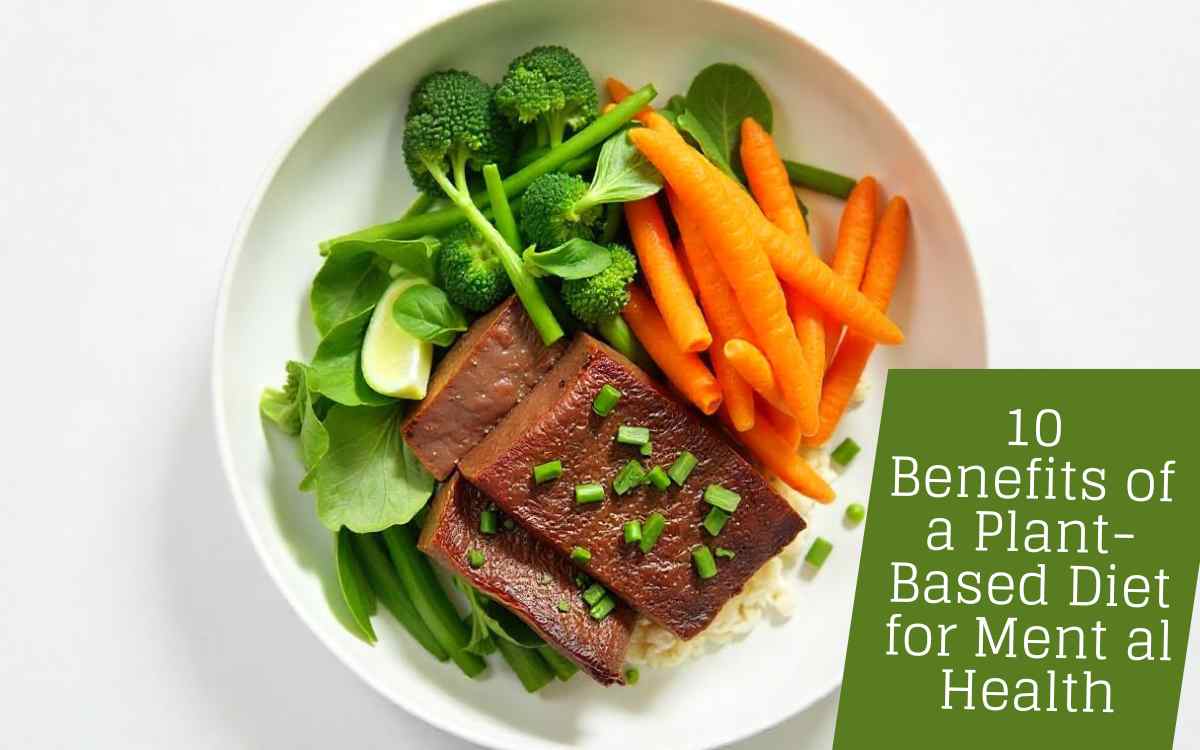10 Benefits of a Plant-Based Diet for Mental Health
A plant-based diet is gaining popularity worldwide. People are exploring its benefits for both body and mind.
Mental health is as important as physical health. A plant-based diet can play a significant role in enhancing mental well-being.
But how exactly does it help? Switching to a diet rich in fruits, vegetables, nuts, and grains can impact your mind positively.
These foods are packed with nutrients that support brain function and mood regulation.
They provide essential vitamins and minerals. Omega-3 fatty acids and antioxidants from plants reduce stress and anxiety.
Additionally, plant-based diets may lower the risk of depression. The lifestyle promotes healthier choices, encouraging a balanced life.
Understanding these benefits can motivate changes that boost mental health.
This article explores ten ways a plant-based diet supports your mind. Let’s dive into the world of plant-based nutrition and mental wellness.
Certainly! Here’s a complete SEO-optimized package for “10 Benefits of a Plant-Based Diet for Mental Health”:
Key Takeaways:
Expert Guidance:

Boosting Brain Function
Are you looking for ways to boost your brain power? A plant-based diet might be your answer.
Besides being great for your body, it can enhance brain function significantly.
Imagine feeling sharper, more focused, and ready to tackle mental challenges with ease.
Let’s dive into how this diet can benefit your cognitive health and improve memory and focus.
Nutrients For Cognitive Health
A plant-based diet is rich in essential nutrients that are vital for your brain. Omega-3 fatty acids, found in flaxseeds and walnuts, are known to support cognitive function.
They help improve communication between brain cells. Additionally, antioxidants from fruits and vegetables protect your brain from oxidative stress.
This keeps your brain healthy and functioning optimally.

Ever wondered why leafy greens are considered brain food? They are packed with vitamins like B6, B12, and folate.
These vitamins help in producing neurotransmitters.
Neurotransmitters are chemicals in your brain that affect mood and memory. A simple salad can be a powerful tool for your cognitive health.
Improved Memory And Focus
A plant-based diet can enhance your memory and focus. Foods like berries and nuts have compounds that boost brain function.
They improve your ability to recall information and concentrate on tasks. Imagine acing that test or meeting without struggling to remember key points.
Have you ever felt foggy after a heavy meal? By choosing plant-based options, you avoid that. These foods provide clean energy, keeping your mind clear and alert.
Studies show that people on plant-based diets report better concentration and mental clarity.
Have you considered how your diet affects your mental performance? If not, now might be a good time to think about it.
By adding more plant-based foods to your meals, you could see a noticeable improvement in your brain’s performance. Wouldn’t it be great to feel more focused each day?
Reducing Stress Levels
Stress affects our daily lives. A plant-based diet can help reduce stress. Plants contain nutrients that calm the mind.
Eating more fruits and vegetables helps balance stress hormones. Less stress means a happier life.
Antioxidants’ Role In Stress Reduction
Antioxidants protect our cells. They fight damage from stress. Fruits and vegetables are rich in antioxidants.
Berries, spinach, and nuts are great sources.
These foods help the body handle stress better. Antioxidants also improve mood and energy levels.

Calming Effects Of Plant-based Foods
Some plant-based foods have calming effects. Bananas, for example, contain tryptophan. This helps the brain produce serotonin.
Serotonin makes you feel happy and calm. Leafy greens also help reduce stress. They contain magnesium, which relaxes muscles and nerves.
Herbal teas like chamomile can also soothe the mind. Their natural properties ease anxiety.
Drinking these teas before bed can improve sleep. Better sleep means less stress the next day.
Enhancing Mood Stability
A plant-based diet offers mental health benefits by enhancing mood stability. Rich in nutrients and antioxidants, it supports brain health.
Reduces inflammation, crucial for maintaining emotional balance.
A plant-based diet can significantly enhance your mood stability. Your food choices impact how you feel daily.
Many people report feeling more balanced and positive when they switch to a plant-based diet. This isn’t just anecdotal; there’s science backing it up.
Foods rich in nutrients can help regulate chemicals in your brain, providing a natural mood boost.
Discover how this dietary change can lead to a happier, more stable you.
Impact On Serotonin Levels
Serotonin is a key player in mood regulation. It’s often referred to as the “happy chemical.” Plant-based diets can increase serotonin production.
Consuming foods high in tryptophan, like nuts and seeds, supports serotonin synthesis. Imagine feeling naturally uplifted just by adjusting your meals.
When you eat more fruits and vegetables, you also get a boost in folate. Folate has been linked to serotonin levels.

Higher folate intake can lead to increased serotonin production.
You might find yourself smiling more often simply because your meals are packed with colorful produce.
Mood-boosting Ingredients
Certain ingredients in plant-based diets can directly uplift your mood.
Omega-3 fatty acids, found in flaxseeds and walnuts, are known for their mood-enhancing properties.
These fats support brain health and can reduce symptoms of depression.
Leafy greens like spinach and kale are rich in magnesium. Magnesium helps calm your nerves and improve sleep quality.
Better sleep often translates to better mood. Consider adding a green smoothie to your daily routine for an easy mood boost.
Ever wondered how spices can impact your mood? Turmeric and saffron have been shown to improve mental health.
These spices can reduce anxiety and stress. Adding a dash of turmeric to your dishes might just be the secret ingredient to a happier day.
Have you tried adding more plant-based foods to your diet? What changes have you noticed in your mood?
Promoting Better Sleep
Embracing a plant-based diet can enhance mental health by promoting better sleep.
These foods provide essential nutrients that aid relaxation and reduce stress. Discover how this diet can improve your mental well-being through restful nights.
A plant-based diet can be a game changer for your mental health, especially when it comes to sleep.
You might not realize it, but what you eat can have a big impact on how well you sleep at night.
Picture this: you’ve had a long day, you’re exhausted, yet you lie awake staring at the ceiling. Frustrating, right? Now imagine the relief of drifting into a deep, peaceful sleep.
A plant-based diet can help you achieve that restful night. It’s about choosing foods that naturally support your body’s sleep cycle and bring balance to your mind.
Sleep-friendly Nutrients
Certain nutrients found in plant-based foods can improve your sleep quality. Magnesium is one of these sleep-friendly nutrients.
It helps your muscles relax and regulates melatonin, the hormone responsible for sleep cycles. You can find magnesium in leafy greens like spinach and Swiss chard.
Another nutrient to focus on is tryptophan, an amino acid that helps produce serotonin, a neurotransmitter that regulates sleep.
Try snacking on a handful of nuts or seeds to boost your tryptophan intake.
Bananas are also a great source and easy to add to your diet. Omega-3 fatty acids play a role in reducing anxiety and depression, which can negatively affect sleep.
Flaxseeds and walnuts are excellent plant-based sources of omega-3s. Adding them to your meals can help you feel more relaxed and ready for bed.
Plant-based Sleep Aids
You can use plant-based foods as natural sleep aids. Chamomile tea is famous for its calming properties.
A warm cup before bed can signal your body that it’s time to wind down. Another option is tart cherry juice.
It’s rich in melatonin and can help you fall asleep faster. Drinking it in the evening might just be the natural remedy you need. Have you tried valerian root?
It’s a herb known to improve sleep quality. You can find it in teas or supplements. If you’re curious about trying new sleep aids, valerian root could be worth exploring.
Have you ever noticed how your diet affects your sleep? Why not experiment with these plant-based options and see how your nights change?
A few simple adjustments could lead to more restful nights and brighter days.
Supporting Emotional Wellbeing
Adopting a plant-based diet can uplift your emotional wellbeing. The foods you eat influence how you feel.
Choosing fruits, vegetables, and whole grains can nurture your mind.
Plant-based foods provide nutrients that support brain health. These nutrients can enhance mood and reduce stress.
Eating plants connects you with nature, bringing peace and balance.
Connection Between Diet And Emotions
The food you eat affects your brain chemistry. This connection shapes your emotions and mood.
Plant-based diets are rich in antioxidants and vitamins. These nutrients help regulate mood and stress levels.
They also reduce inflammation in the brain. This can prevent mood swings and anxiety. A balanced diet keeps your mind clear and focused.
Foods That Elevate Happiness
Certain plant-based foods can boost happiness. Leafy greens like spinach contain folate.
Folate supports serotonin production, which stabilizes mood. Berries are high in antioxidants.
These protect the brain from oxidative stress. Nuts and seeds, rich in omega-3s, also improve brain health.
Bananas, high in vitamin B6, can enhance your mood. Including these foods can bring joy and calmness.
Improving Concentration
A plant-based diet supports mental health by boosting concentration and focus.
Nutrient-rich foods enhance brain function, reducing stress. Improved mood and clearer thinking are added benefits.
Improving concentration is a crucial benefit of adopting a plant-based diet.
Imagine being able to focus better at work or school without the constant distractions of a wandering mind.
A plant-based diet can offer the nutrients your brain needs to enhance focus and concentration, while also helping you avoid mental fatigue.
Focus-enhancing Nutrients
Plant-based foods are packed with nutrients that support brain health.
Leafy greens like spinach and kale are rich in folate, which is known to improve cognitive functions.
Nuts and seeds provide omega-3 fatty acids, crucial for brain health and concentration.
Whole grains such as quinoa and brown rice release glucose slowly, providing your brain with a steady supply of energy.
This helps maintain focus throughout the day.
Eating a variety of colorful fruits and vegetables ensures you get a range of antioxidants, which protect brain cells from damage.
Have you ever noticed how alert you feel after a smoothie packed with berries, spinach, and flaxseeds?
That’s the power of focus-enhancing nutrients at work. By adding these foods to your daily meals, you can support your brain in staying sharp and attentive.
Avoiding Mental Fatigue
Mental fatigue can creep in when you’re not nourishing your brain properly. A plant-based diet can help you avoid this exhaustion.
Foods high in refined sugars or unhealthy fats can lead to energy crashes, making it difficult to concentrate.
Instead, plant-based diets emphasize whole, unprocessed foods that provide sustained energy.
A lunch of chickpea salad with avocado and a side of sweet potato can keep you full and focused all afternoon.
Hydrating with plenty of water and herbal teas also supports mental clarity. Reflect on a time you felt sluggish after a heavy meal.
Contrast that with the light, energized feeling after a fresh, plant-based meal.
The difference is stark, and it’s all about giving your brain the right fuel. Can you imagine how much more you could achieve by simply choosing foods that avoid mental fatigue?
Reducing Anxiety Symptoms
Experiencing fewer anxiety symptoms may be one of the benefits of a plant-based diet.
Rich in nutrients, these diets promote mental well-being. Consuming more fruits and vegetables can support healthier brain function.
Reducing anxiety symptoms can be a challenging journey, but a plant-based diet might offer a natural and effective way to ease your mind.
Many people find that switching to a diet rich in fruits, vegetables, and whole grains helps them feel calmer and more in control.
Let’s delve into how certain elements of a plant-based diet can play a significant role in reducing anxiety symptoms.
Calming Effects Of Whole Foods
Whole foods, such as fresh fruits, vegetables, nuts, and seeds, are packed with essential nutrients that help in calming your nervous system.
Eating whole foods can stabilize your blood sugar levels, which is crucial for maintaining a balanced mood.
If you’ve ever felt jittery after a sugary snack, you know how important it is to keep your blood sugar stable. Consider adding foods like leafy greens, berries, and almonds to your meals.
These foods are rich in magnesium, a mineral known to have calming effects on the brain.
Next time you’re feeling anxious, think about whether your diet could be playing a role.
Role Of Omega-3 Fatty Acids
Omega-3 fatty acids are crucial for brain health and can significantly impact your mood and anxiety levels.
While commonly associated with fish, you can also find omega-3s in plant-based sources like flaxseeds, chia seeds, and walnuts.
These foods provide a healthy alternative for those following a plant-based lifestyle.
Including omega-3-rich foods in your diet can improve brain function and reduce inflammation, both of which can help ease anxiety symptoms.
Imagine how much more relaxed you might feel with just a few simple dietary changes.
Are you getting enough omega-3s in your daily meals?
Switching to a plant-based diet doesn’t have to be an all-or-nothing approach.
Try adding more whole foods and omega-3s gradually and observe the changes in your mood and anxiety levels. What small step can you take today for a calmer tomorrow?
Enhancing Resilience
A plant-based diet boosts mental health by providing essential nutrients that enhance brain function.
It improves mood and reduces anxiety, helping build resilience. Rich in antioxidants, this diet supports mental clarity and emotional balance.
In today’s fast-paced world, mental resilience is crucial. A plant-based diet can play a vital role in enhancing resilience.
This dietary choice not only benefits physical health but also strengthens the mind.
By embracing plant-based foods, individuals may experience improved mental fortitude and stress management. Dive into how a plant-based lifestyle can boost mental resilience.
Building Mental Strength
A plant-based diet aids in building mental strength.
It provides essential nutrients which support brain function. Fruits and vegetables are rich in antioxidants.
These antioxidants help protect brain cells from damage. Whole grains offer sustained energy levels. This energy is crucial for maintaining focus throughout the day.
Nuts and seeds are packed with omega-3 fatty acids.
Omega-3s are known to improve mood and cognitive function. Consuming a variety of plant-based foods can sharpen mental clarity.
Nutritional Support For Stress
Plant-based foods offer nutritional support for stress management. Leafy greens contain magnesium.
Magnesium is known to reduce stress levels. Berries are high in vitamin C. This vitamin is essential for combating stress-related fatigue.
Legumes provide protein and fiber.
These nutrients stabilize blood sugar, preventing mood swings. Avocados have healthy fats.
These fats are necessary for neurotransmitter regulation. A balanced plant-based diet can help in managing stress effectively.
Balancing Hormonal Health
Embracing a plant-based diet can enhance mental clarity and emotional balance.
It supports hormone regulation, reducing stress and anxiety. This approach nourishes the brain with essential nutrients.
Balancing hormonal health is crucial for mental wellness. Hormones control mood, stress levels, and sleep patterns. A plant-based diet can support hormonal balance naturally.
It offers nutrients that help maintain stable hormone levels. This stability can lead to improved mental clarity and mood regulation.
Understanding how diet affects hormones is essential for optimizing mental health.
Diet’s Impact On Hormones
Diet plays a vital role in hormone production. Nutrients from food influence how hormones are created and released.
A plant-based diet is rich in essential vitamins and minerals. These nutrients support the body’s ability to produce hormones efficiently.
Eating a variety of fruits, vegetables, and grains provides antioxidants.
Antioxidants protect cells and help regulate hormonal activity. This regulation can lead to better emotional stability.
Foods For Hormonal Balance
Certain plant foods enhance hormonal health. Leafy greens like spinach and kale offer magnesium.
Magnesium aids in hormone synthesis. Nuts and seeds provide healthy fats. These fats are crucial for hormone production. Whole grains like quinoa and oats offer fiber.
Fiber helps remove excess hormones from the body. Beans and lentils are good sources of protein.
Protein is necessary for building hormones. Including these foods in daily meals can promote hormonal balance naturally.
Supporting Cognitive Longevity
A plant-based diet supports cognitive longevity by enhancing mental health. Nutrient-rich foods boost brain function and improve mood.
These benefits foster better memory and focus, promoting a healthier mind.
Switching to a plant-based diet isn’t just about improving your physical health; it can also support your mental well-being, particularly your cognitive longevity.
Cognitive longevity refers to maintaining brain health and mental sharpness as you age. By choosing plant-based foods, you might be doing more for your brain than you realize.
Let’s dive into how a plant-based diet supports long-term brain health and helps prevent cognitive decline.
Long-term Brain Health
Eating plant-based foods provides essential nutrients that your brain needs to stay healthy.
Leafy greens, nuts, and seeds are rich in omega-3 fatty acids, which are crucial for brain function. These nutrients help maintain the structure and function of your brain cells.
I remember when my grandmother added more plant-based foods to her diet. She noticed she felt more alert and focused. Her experience highlights how diet choices can influence brain health.
Including a variety of colorful fruits and vegetables in your diet ensures that you get antioxidants.
Antioxidants protect your brain from oxidative stress, which can damage your brain cells over time. Could adding more colors to your plate improve your mental clarity?
Preventing Cognitive Decline
A plant-based diet may lower the risk of cognitive decline. Studies show that people who eat more plant foods have a reduced risk of developing dementia.
This may be because plants contain compounds that reduce inflammation and protect brain cells.
Whole grains and legumes are excellent sources of B vitamins. These vitamins play a crucial role in maintaining brain health and reducing age-related decline.
Could swapping white rice for quinoa make a difference in your mental agility? Additionally, the fiber found in plant-based foods supports gut health, which is linked to brain function.
A healthy gut can lead to a healthier brain, potentially slowing cognitive decline.
Have you considered how your diet might be impacting your mental health? By making small changes to your diet, you can support your cognitive longevity.
Try adding more plant-based foods to your meals and observe any changes in your mental clarity and focus. It’s a simple step that could have lasting benefits for your brain.
FAQ of 10 Benefits of a Plant-Based Diet for Mental Health
What Are The Mental Benefits Of Plant-based Diet?
A plant-based diet boosts mental health by reducing stress and anxiety.
It improves mood and cognitive function. Rich in antioxidants and nutrients, it supports brain health.
This diet promotes better sleep and increases mental clarity. Plant-based foods enhance overall mental well-being, leading to a happier, healthier mind.
What Happens To Your Body When You Start Eating Plant-based?
Eating plant-based improves digestion and boosts energy. It can aid weight loss and enhance heart health.
Nutrient intake increases with more fiber, vitamins, and minerals.
Over time, cholesterol levels may drop, and inflammation can decrease, promoting overall well-being.
How Quickly Do You See The Benefits Of A Plant-based Diet?
Benefits of a plant-based diet can appear within a few days.
Increased energy and improved digestion are common. Over weeks, cholesterol and blood pressure may lower.
Long-term benefits include reduced risk of chronic diseases. Results vary based on individual health and dietary adherence.
What Is The Best Diet For Mental Health?
A balanced diet rich in fruits, vegetables, whole grains, lean proteins, and omega-3 fatty acids supports mental health. Include foods like salmon, nuts, berries, and leafy greens.
Limit processed foods, sugar, and caffeine. Staying hydrated and maintaining regular meals can also enhance mood and cognitive function.
Conclusion
A plant-based diet supports mental health. It boosts mood and focus. Rich in nutrients, it reduces anxiety and stress.
You feel energized and clear-minded. Plant foods are natural stress relievers. They promote better sleep and relaxation. Eating greens can improve memory.
You gain mental clarity and emotional balance. It’s gentle on your mind and body. Consider embracing plant-based meals.
Experience positive changes in your mental well-being. Small steps lead to big improvements. Healthier choices offer lasting benefits. Enjoy the journey to a healthier mind.
Feel the difference in your daily life.






